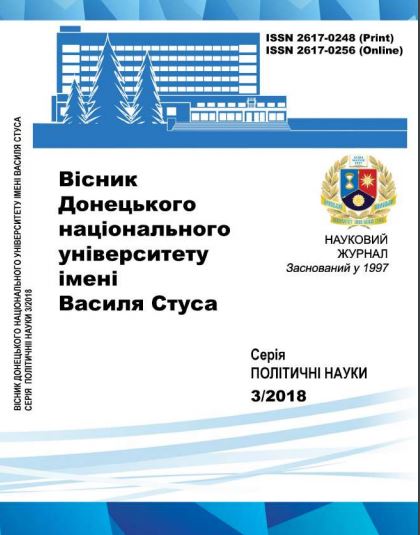Anticorruption initiatives of Bulgarian civil society: assessment of their influence on systemic corruption.
DOI:
https://doi.org/10.31558/2617-0248.2018.3.11Keywords:
Bulgaria, civil society, corruptionAbstract
The article studies the participation of Bulgarian civil society in corruption counteraction on the national levels. It determines the extent of the “capture” of the state by corruption and underlies the systemic character of corruption in this country despite over a decade of EU membership. It is emphasized that the modern corruption practices in Bulgaria originated in the late 1980s and early 1990s: the overthrow of the communist regime and transition to market economy caused the emergence of informal groups of the former communist nomenklatura. It is noted that these groups still control the decision-making processes in the country by their activities in the “shadow zone” of politics, economy, and justice. Corruption significantly reduces the effect of the EU financial assistance and is an obstacle to Bulgaria’s accession to the Schengen Area. The author notes that corruption counteraction has been included in the agenda of public policy only since the formation of I. Kostov’s democratic government in 1997. The final decision concerning the European integration vector in Bulgaria’s development led to the government and civil society cooperation in defining the national anti-corruption policy.
The analysis of the pace of reforms in Bulgaria made it possible to conclude that this country has fallen into a post-communist trap, being in the “grey zone” between socialism and capitalism: de facto, several families form the Bulgarian politics; the media owners usually have close ties with the political elite, leading to lack of quality investigative journalism and to pronounced self-censorship of journalists; none of the Bulgarian ex-government officials have been convicted of corruption crimes. What makes Bulgaria significantly different from the other Central and Eastern European countries (especially Romania and Slovakia) is that the protest actions are not strong enough to force the authorities to take them into account. The largest surge in anti-corruption protests (three “waves”) was noted in 2013: 1) protests of socio-economic nature, complemented by anti-corruption demands (January – February); 2) protests against corruption and oligarchic political system (June – July); 3) student anti-corruption protests (November). The author emphasizes that currently the Bulgarian civil society remains relatively weak in its anti-corruption activities. The main obstacles to the effective work of the non-governmental sector include a rather limited participation of the NGOs in the public and political life, lack of solidarity etc.
References
Академія демократії. Посібник політичної та громадянської освіти для України. Люблін: Європейський дім зустрічей – Фундація Новий Став, 2008. ‒ 168 с.
Боднараш Г. «ЧЕСНОметр» в країнах Центрально-Східної Європи: порівняльний аспект [Електронний ресурс]. – Режим доступу: http://h-bodnarash.vkursi.com/3977.html
Бройєр Р., Грабська А. Болгарам набридла корумпованість і кумівство політиків [Електронний ресурс]. – Режим доступу: http://p.dw.com/p/19FT1
Дакова В. Българският неправителствен сектор в контекста на развитие. София: Фондация «Работилница за граждански инициативи», 2003.
Катанска, Ц. (2017). Повдигнаха 146 обвинения на Цветан Василев [Електронний ресурс]. – Режим доступу: http://news.bnt.bg/bg/a/povdignakha-146-obvineniya-na-tsvetan-vasilev
Коцева О. Корупція в європейській Болгарії [Електронний ресурс]. – Режим доступу: https://www. radiosvoboda.org/a/26930457.html
Кумар І. Інтерв’ю з Президентом Болгарії Р. Радєвим [Електронний ресурс]. – Режим доступу: http://ua.euronews.com/2017/02/16/sanctions-hurt-russia-and-the-eu-says-bulgaria-president- rumen-radev
Кушнарьов І. В. Досвід нових держав-учасниць ЄС у боротьбі з політичною корупцією: приклад Болгарії / І. В. Кушнарьов // Матеріали міжн. наук.-практ. конф. «Актуальні наукові дослідження різноманітних соціальних процесів». ‒ Одеса: Причорноморський центр дослідження проблем суспільства, 2017. ‒ С. 86‒90.
Кушнарьов І. В. Інструменти боротьби з політичною корупцією у країнах Центральної та Східної Європи: оцінка ефективності на прикладі Румунії та Болгарії / І. В. Кушнарьов // Політикус. ‒ 2017. ‒ № 4. ‒ С. 58‒61.
Президент Болгарии не видит достаточной политической воли для борьбы с коррупцией в высших эшелонах власти [Електронний ресурс]. – Режим доступу: http://www.novinite.ru/articles/26262/
Семиженко А. Болгарія: голоси. Політолог. [Електронний ресурс]. – Режим доступу: http://dalibude.com.ua/daniel-smilov/
Чавдарова Т. Коррупция в посткоммунистической Болгарии / Т. Чавдарова // Неформальная экономика в постсоветском пространстве: проблемы исследования и регулирования; под ред. И. Б. Олимпиева, О. В. Паченкова. ‒ Санкт-Петербург: Центр независимых социальных исследований, 2003. ‒ С. 25‒36.
Corruption and Anti-corruption Policy in Bulgaria. Monitoring the EU accession process: corruption and anti-corruption policy. Open Society Institute, 2002. ‒ 77 р.
En Bulgarie, une corruption endémique [Електронний ресурс]. – Режим доступу: http://www.lejdd.fr/international/ ue/en-bulgarie-une-corruption-endemique-3533927
Gallup Poll: Subject of Corruption Marks Beginning of Bulgaria’s Political Autumn [Електронний ресурс]. – Режим доступу: http://rai-see.org/gallup-poll-subject-of-corruption-marks-beginning-of-bulgarias-political-autumn/
Krasimorov A. Bulgaria president vetoes anti-corruption law [Електронний ресурс]. – Режим доступу: https://www.reuters.com/article/us-bulgaria-politics/bulgaria-president-vetoes-anti-corruption-law-idUSKBN1ER0S9
Mulloboeva Z. Is Bulgaria Losing the War on Corruption? [Електронний ресурс]. – Режим доступу: http://www.gfintegrity.org/is-bulgaria-losing-the-war-on-corruption/
Panev B. Report on a seminar on Prospects for Curbing Corruption in Bulgaria // BTA. ‒ 2017. ‒ 7 Feb.
Rankin J. Cloud of corruption hangs over Bulgaria as it takes up EU presidency. The Guardian. ‒ 2017. ‒ 27 Dec.
Smilov D., Dorosiev R. Perceptions of Corruption in Bulgaria A Content Analysis of Documents from Politics, Judiciary, Police, Media, Civil Society and Economy. Discussion Paper Series, 7 [Електронний ресурс]. – Режим доступу: https://kops.uni-konstanz.de/bitstream/handle/ 123456789/11427/Perceptions_of_corruption_in_ Bulgaria.pdf? sequence=1
Tchompalova Y. Corruption in Bulgaria [Електронний ресурс]. – Режим доступу: https://irsocietyjcu.com/2018/01/10/corruption-in-bulgaria/
Zalan E. Ten years on, Romania and Bulgaria still dogged by corruption [Електронний ресурс]. – Режим доступу: https://euobserver.com/justice/136673

